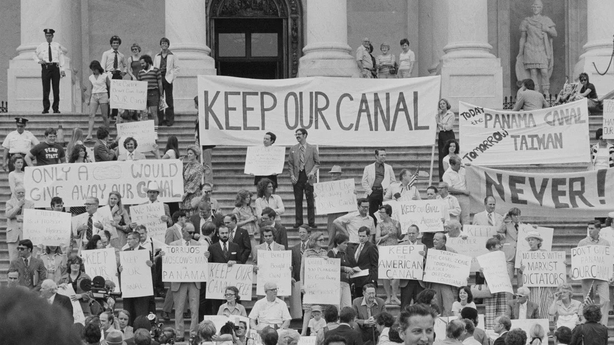Opinion: the project was a "tropical hell" marked by brutal racial segregation and the mass mortality of foreign workers
By Bryce Evans, Liverpool Hope University
When new US president Donald Trump cited the US construction of the Panama Canal as the basis for his claim to the waterway, he invoked a project marked by brutal racial segregation and the mass mortality of foreign workers. Trump claimed that the United States "lost 38,000 lives in the building of the Panama Canal", but this is a false cumulative tally. It conflates the over 25,000 lives lost in the failed French attempt to build the Canal in the 1880s to the over 6,000 lives lost during the US project between 1904 and 1914. It is also disingenuous: the vast majority of those who died were subjects of the British Crown from the Caribbean islands.
Trump's inaugural address fondly referred to Teddy Roosevelt, the US president most associated with the Panama Canal, citing it as one of "the great things he did". The reference was telling. When Trump was pictured flipping burgers in a suburban McDonald’s on the campaign trail, it was straight out of the Roosevelt playbook.
We need your consent to load this rte-player contentWe use rte-player to manage extra content that can set cookies on your device and collect data about your activity. Please review their details and accept them to load the content.Manage Preferences
From RTÉ News, new US president Donald Trump says he won't rule out the use of force over US claim to the Panama Canal
In November 1906, Roosevelt became the first president to conduct a visit abroad when he went to inspect work on the Panama Canal. In keeping with his sleeves-rolled-up image, he skipped a formal lunch at Panama’s exclusive Tivoli Hotel and instead walked unannounced into a labourers’ mess hall at La Boca, where he sat down to eat a thirty-cent lunch alongside several hundred surprised workers.
However, the upbeat spirit of the US Progressive Era which this image evokes - and which Trump’s inaugural speech was keen to embrace – masked the tropical hell experienced by most of the workforce. When Roosevelt sat down to his mash potatoes and beef, it was in a whites-only mess hall. He therefore had the luxury of eating from a plate with a knife and fork, resting the presidential posterior on a wooden bench and his elbows on a table.
In the mess halls provided by the US military for the majority Afro-Caribbean workforce, there were no chairs or tables: men had to spoon poor quality grub into their mouths from a mess tin while standing up or squatting, often under armed guard. This was just one of the everyday realities during the American-overseen building of the Panama Canal, the Gilded Age "project" which Trump referred to admiringly in his inauguration speech functioned as a sort of decade-long tropical apartheid.
From History, how the Panama Canal was built
Beneath Trump’s reference to "38,000 lives" lies a difference in mortality statistics between the French and American periods of control over the Canal scheme. This is explained by the perilous nature of the work and, more importantly, advances in medical understanding, most notably in the confirmation of mosquito transmission of yellow fever and malaria. US-led sanitation efforts reduced deaths from these diseases.
But the epidemiology of the time was itself infused with racist assumptions: the US would make Panama "wholesome" by subjecting a "mixed population of the lowest type" to sanitary "clean up". All of this would take place in 'the Zone': a ten-mile-wide strip of militarised settlement under the control of the US Secretary of War from which the local population was forcibly displaced; it was, to quote one historian, America’s "test tube republic".
In America’s "test tube republic", American engineers and their families lived in lavish homes where housewives enjoyed the latest labour-saving technology and shopped and socialised in whites-only spaces. Their kids dared not stray the short distance beyond the white picket fences to the substandard shacks and barrack rooms where West Indian laborers spilled out of crowded bunks.
From TED-Ed, the dark history of the Panama Canal involving demolition, disease and death
The abundant local availability of fresh fruit and vegetables was spurned in favour of "safe" food shipped 2,000 miles in refrigerated containers from the continental United States. "Civilised" WASP virtues of self-control and hard work were to be maintained by not "mixing". Meanwhile, local settlements were cleared so that US government ecologists had a "little world in itself" in which to conduct experiments.
These divisions were not merely a question of skilled versus unskilled labour. Black workers, the majority of the "38,000 lives" referred to by Trump, were paid 13 cents an hour compared to 40 cents an hour for unskilled European labourers. Incredibly, US authorities claimed that comparatively "the negro is the better paid" in this situation because of his supposedly inferior "intelligence, physical strength, endurance and vitality". Meanwhile, poorer food and general sanitation in black spaces led to serious outbreaks of dysentery and mass defections.

This all amounted, in the words of one contemporary observer, to an "ideal paradise for white people". Venturing from the whites-only areas of the Zone to the less salubrious surrounds of black workers, noted another, was "like going from paradise to darkest Mississippi".
While his ‘engineer-soldiers’ were publicly trumpeted as the vanguard of American greatness, Roosevelt himself - whose mess house meal encapsulated the Canal’s universalist promise - would privately rue how poor conditions were for black workers. This was a perspicacity missing from the Panama pronouncements of his latest successor as US president.
The author's research was funded by the Linda Hall Library.
Prof Bryce Evans is Professor of Modern World History at Liverpool Hope University
Follow RTÉ Brainstorm on WhatsApp and Instagram for more stories and updates
The views expressed here are those of the author and do not represent or reflect the views of RTÉ

